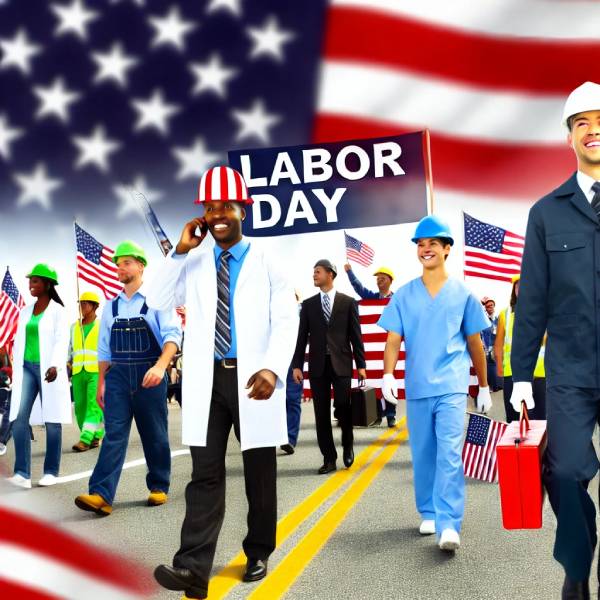

Labor Day, observed annually on the first Monday of September, is a federal holiday in the United States dedicated to celebrating the achievements and contributions of American workers. Over the years, it has evolved into a time for relaxation, family gatherings, and end-of-summer celebrations, but its roots lie in the labor movement of the late 19th century. This article explores the history of Labor Day, how it became a federal holiday, and its significance in American culture. We’ll also look at some interesting facts about the holiday that might surprise you.
Labor Day was born out of the labor movement, which gained momentum during the Industrial Revolution in the United States. In the late 19th century, American workers faced harsh working conditions. They often worked 12-hour days, seven days a week, and children as young as five were part of the workforce in factories, mills, and mines. Workers received little protection, and wages were low, while industries profited greatly.
The labor movement sought to address these injustices. Workers organized strikes, protests, and rallies to demand better working conditions, fair wages, and shorter work hours. These efforts eventually led to the formation of labor unions, which played a significant role in advocating for workers' rights.
The idea of a "workingmen's holiday" originated in the labor union movement. On September 5, 1882, the first Labor Day parade was held in New York City, organized by the Central Labor Union. Approximately 10,000 workers took unpaid time off to march in a parade from City Hall to Union Square, carrying banners that called for "less work, more pay" and other workers' rights slogans. The parade was followed by speeches, a picnic, and celebrations.
This initial event was so successful that the Central Labor Union planned another Labor Day celebration the following year, and the movement began to spread to other cities across the country.
As the labor movement gained strength, more cities and states began to adopt Labor Day as an official holiday. In 1887, Oregon became the first state to officially declare Labor Day a state holiday, followed by New York, Massachusetts, and Colorado. By the end of the 1880s, more states had followed suit, reflecting the growing influence of labor unions and the increasing awareness of workers' rights.
While the labor movement was gaining momentum, tensions between workers and employers sometimes erupted into violence. One of the most significant incidents was the Pullman Strike of 1894, which began as a railroad workers' strike in Chicago and quickly escalated into a national conflict. The strike caused widespread disruption to railroad service, and President Grover Cleveland eventually ordered federal troops to intervene, resulting in violent clashes and the deaths of several workers.
In the wake of the Pullman Strike, there was growing public support for labor reforms. To help ease tensions with the labor movement and as a gesture of goodwill toward American workers, President Grover Cleveland signed legislation making Labor Day a federal holiday. On June 28, 1894, Congress passed a law declaring the first Monday in September a national holiday dedicated to honoring American workers and their contributions to the country.
The creation of Labor Day as a federal holiday helped solidify the importance of workers' rights in the national conversation and acknowledged the role that American laborers had played in the country’s economic and industrial growth.
While the origins of Labor Day are rooted in the labor movement, the holiday has since evolved into a day for relaxation and celebration. For many Americans, Labor Day marks the unofficial end of summer, and it’s often associated with family barbecues, picnics, and outdoor activities. Many communities also hold parades and fireworks displays to commemorate the holiday.
For some, Labor Day is a time to reflect on the achievements of the labor movement and the progress that has been made in securing workers' rights. However, for most people, it’s simply a day off work and an opportunity to spend time with loved ones before the fall season begins.
Over the years, Labor Day has also become known for its retail sales events. Many businesses offer significant discounts on clothing, appliances, electronics, and other goods, making it one of the biggest shopping weekends of the year. For some, the Labor Day sales are as much a part of the holiday as the barbecues and parades.
Another Labor Day tradition is the start of the college football season. For sports fans, Labor Day weekend marks the kickoff of the fall football season, with several high-profile college games taking place over the long weekend.
As a federal holiday, Labor Day affects various aspects of business and legal operations, particularly in terms of deadlines:
It’s important to plan ahead when dealing with deadlines or financial transactions around Labor Day. Tools like DeadlineCalculator.com can help individuals and businesses stay on top of deadlines during federal holidays.
Labor Day has evolved from its roots in the labor movement to become a federal holiday that celebrates the achievements of American workers and provides a well-deserved day of rest. From its first parade in New York City to its official recognition as a federal holiday in 1894, Labor Day remains an important reminder of the contributions that workers have made to the country's growth and prosperity. As Americans celebrate with family gatherings, parades, and sales, the holiday continues to serve as a tribute to the labor movement and its lasting impact on the nation.
Note: This article provides historical insights into Labor Day as a federal holiday. For more information on how federal holidays impact deadlines, visit DeadlineCalculator.com.